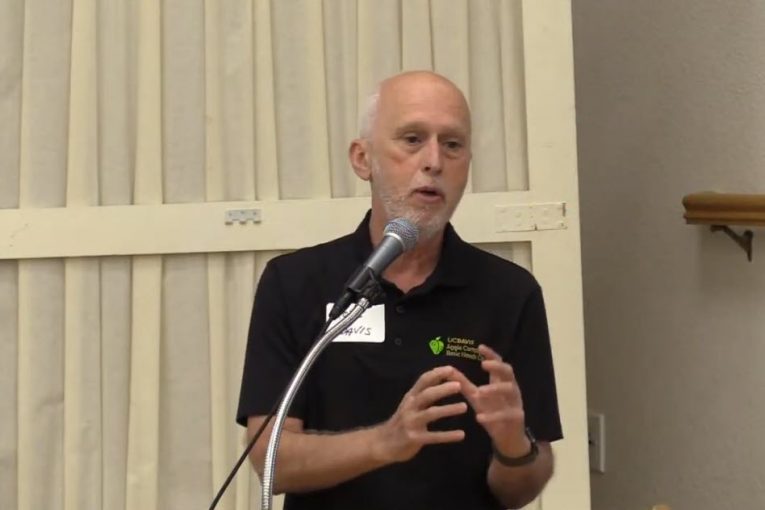
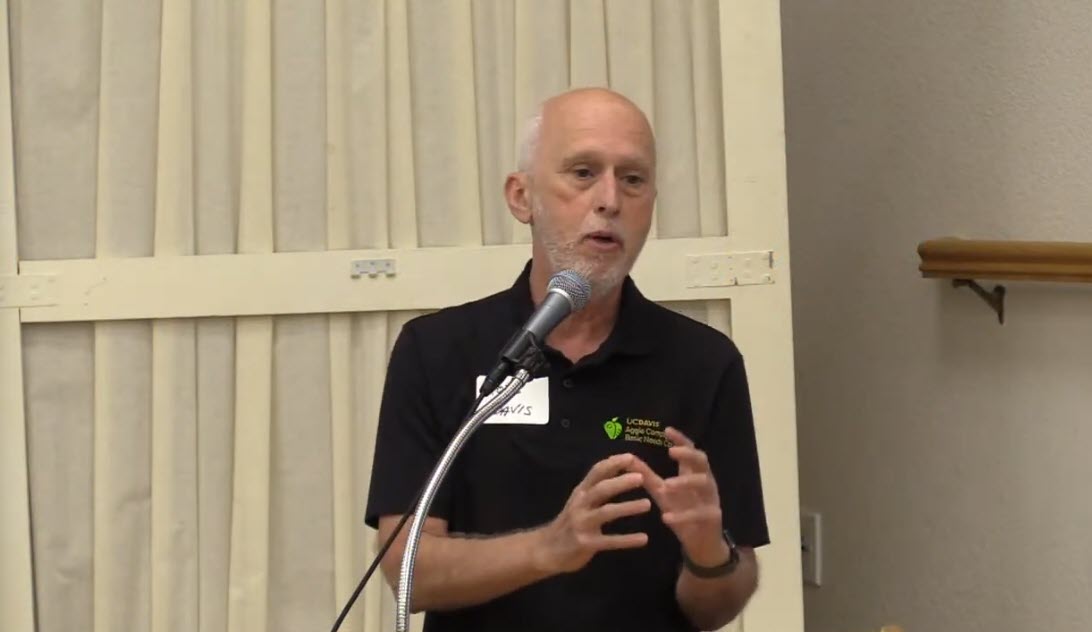
Editor’s Note: On Thursday, Interfaith Housing Justice of Davis presented “Davis Housing Solutions: A Community Conversation” – a forum at the Davis Community Church. What follows are the full comments by Robb Davis, Former Mayor & Director UC Davis Aggie Compass
Full comments by Robb Davis:
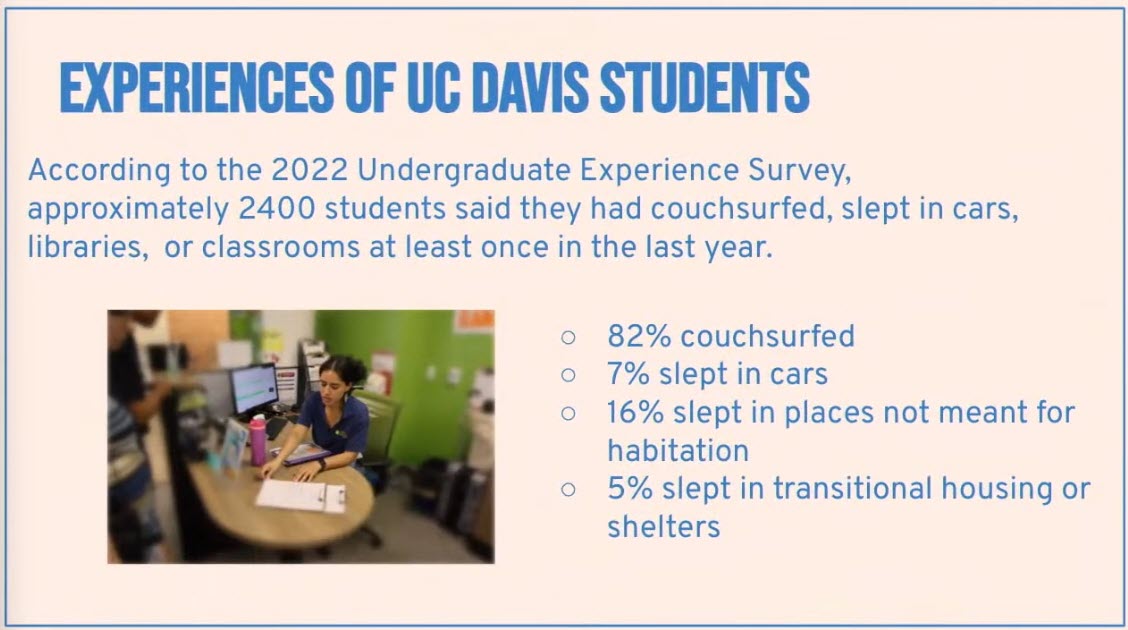 So undergraduate experience survey from 2022 found that approximately 2,400 students said they had been in a state of houselessness at one point during the year, couch surfing, sleeping in cars. Some of these overlap, many students couch surf. Now this is a transient kind of situation. There are very few students that stay for long periods in these states.
So undergraduate experience survey from 2022 found that approximately 2,400 students said they had been in a state of houselessness at one point during the year, couch surfing, sleeping in cars. Some of these overlap, many students couch surf. Now this is a transient kind of situation. There are very few students that stay for long periods in these states.
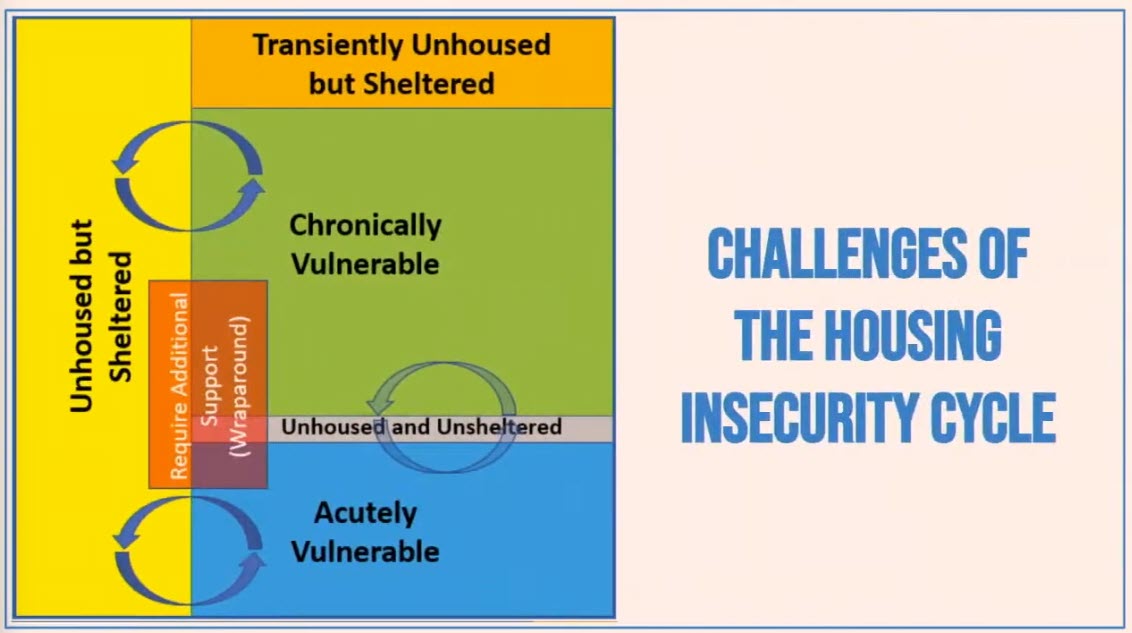
I’ve been working on trying to figure out a picture for this for awhile. But rather than unhoused, chronically unhoused situations, most students find themselves in a vulnerability sort of continuum. And I want to, I’ve been trying to picture exactly what’s going on. And this diagram illustrates some different categories. Many students are chronically vulnerable, like what Judy was talking about in terms of paying rent. There are many students who are trying to figure it out month to month.
And you can see that students in those situations do at times then move into being unhoused, but sheltered in some way. So they’re unhoused, they don’t have a permanent place anymore, but they’re couch surfing, they’re sleeping in their car. A good example of a chronically vulnerable student is the guy who was in my office today lives in, he’s a transfer student, very vulnerable population, first gen, also very vulnerable, lives out of town, commutes in, has two side hustles to pay the bills. His side hustles  require a car, as does his commute. And his car broke down, $800 bill. It’s going to possibly put him out of housing.
require a car, as does his commute. And his car broke down, $800 bill. It’s going to possibly put him out of housing.
The acutely vulnerable. Another category that we see this spring, four students showed up in our office and said there was mold in their house and they have to move out immediately. They have no place to go. They’re all from Southern California, can’t go home. They’re in the middle of their quarter then are left unhoused at the shelter. Those are students whose hustle is actually to couch surf throughout the entire time they’re at UC, Davis, possibly sleeping in their car. So a good example of this is a student who was doing that successfully for three years and then got joint custody of his daughter and did not want to couch surf anymore, didn’t feel he could couch surf with his daughter anymore and do it safely.
The ones at the top as a category I came up with, it doesn’t exist in any HUD definition, transiently, unhoused, but sheltered. These are what we call the long commuters, a transfer student from Fresno, who was in her last quarter, a returning student, was driving up from Fresno, two kids in Fresno, driving up from Fresno every week, sleeping in her car for three nights and then driving back home and then it got cold and it got dark and then she was scared. It took her a month to find the courage to come and seek help. Now those are just vignettes. I think the number of students who are truly unhoused and unsheltered is very small, thankfully, but we have these categories of students. Another chronically vulnerable is a student who delivers pizza in our town and then her car broke down and so her means of income is gone.
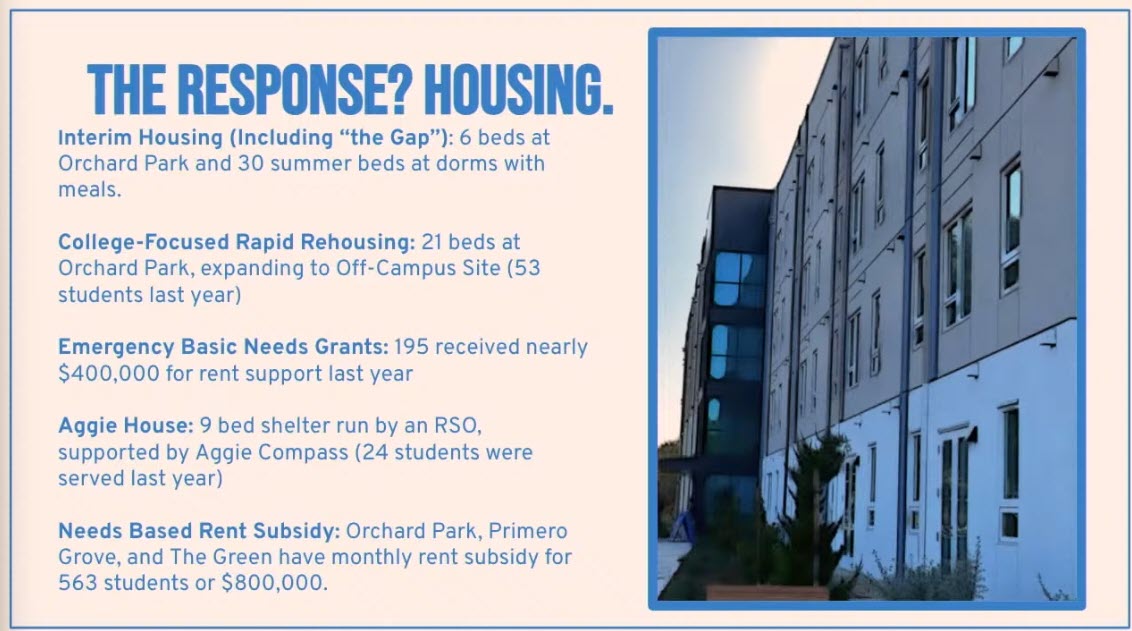
Others face insurance costs or their parents get sick. I had a student who’s sleeping in a closet. He’s lucky to be paying only $500. He says, I can’t keep sleeping in the closet, and he just admits to me that he’s sending a lot of his financial aid home to his mom who’s been sick. This is the reality and this goes beyond the 2,400 who experienced some level of houselessness during the year. The last slide I want to show is what we’re doing about it.
Last slide that I have is just a few of the things we’re doing. We’ve master leased, that is, Aggie Compass basic needs center on campus under Student Affairs. We’ve master released six beds at Orchard Park. The mold victims we’re moved into Orchard Park into interim housing so that they had a place to stay for the month while the remediation took place this summer, we’ll probably house 30 or 40 students who face gaps in their leases in conference housing. Our college focus rapid rehousing program is for students who have additional wraparound needs. Bill talked about substance use disorders. Bill talked about folks who have untreated mental health. That happens among students as well. And so we have 21 beds, Orchard Park, where we can put students for intensive wraparound services so that they can succeed in their education and have housing.
We’ll give close to $400,000 in rental support grants. These are emergency grants. Just gave one today to an international student who found himself unable to buy groceries and we covered a couple months of his rent, so we’ll give $400,000 in those in Aggie House, which is a registered student organization. It just received an honor from the city, the hort. We support them so that they can house a true shelter environment over at the Belfry just off campus. And then last, you may not have heard about it, maybe you’ve hadn’t heard of any of these, but last is that there is an ongoing, essentially a voucher program run out of Orchard Park from Merri Grove in the green. Those are on campus housing that provides 563 students with monthly 100, 200 or $300 rental supports. Now, there’s a lot of issues around why students find themselves in this situation. Most of these students that come to us have what you would consider generous financial packages. The complexity of how students convert financial support into actual living is where the rub really is and I’d be happy to answer your questions about that when the time comes.






For reasons that are not clear to me, the most important thing Robb said (amongst a lot of really important and resonant things) was his statement that “we need to show empathy … empathy for our neighbors”
That is a really powerful statement … one that I personally identify with. Perhaps David can post a link to the actual video so that we can hear, as well as seed those powerful words.
Hit this link: video
Thank you
Robb’s resonant comment was at 1:58 54 in the video during the first round of follow-up statements. In it he said:
“I think from the perspective of the students at UC Davis … Many of you went to universities … this is not your university … it is a new university successfully attracting first gen, historically underrepresented populations … low income students. These are our students. And they are going to be contributing to this community for many years. So my plea is, be empathetic towards the reality that many of the students who are here, struggle every day to figure out how to pay for their housing. Just be empathetic. Don’t write them off. Show compassion for them, because they are going to be the leaders of this community and this State going forward. We need to support them.”